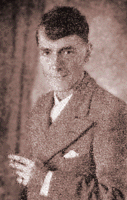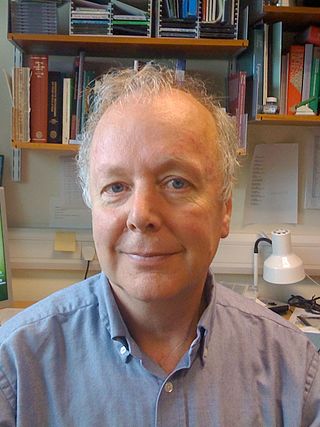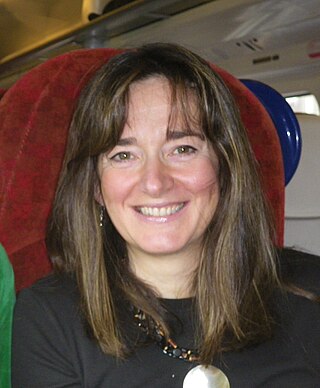Related Research Articles

The African clawed frog, also known as simply Xenopus, African clawed toad, African claw-toed frog or the Platanna) is a species of African aquatic frog of the family Pipidae. Its name is derived from the short black claws on its feet. The word Xenopus means 'strange foot' and laevis means 'smooth'.

The Royal Institution of Great Britain is an organisation for scientific education and research, based in the City of Westminster. It was founded in 1799 by the leading British scientists of the age, including Henry Cavendish and its first president, George Finch. Its foundational principles were diffusing the knowledge of, and facilitating the general introduction of useful mechanical inventions and improvements, as well as enhancing the application of science to the common purposes of life.

Sir John Bertrand Gurdon is a British developmental biologist, best known for his pioneering research in nuclear transplantation and cloning.

Margaret Ann Boden is a Research Professor of Cognitive Science in the Department of Informatics at the University of Sussex, where her work embraces the fields of artificial intelligence, psychology, philosophy, and cognitive and computer science.

Lancelot Thomas Hogben FRS FRSE was a British experimental zoologist and medical statistician. He developed the African clawed frog (Xenopus laevis) as a model organism for biological research in his early career, attacked the eugenics movement in the middle of his career, and wrote popular books on science, mathematics and language in his later career.

Dame Georgina Mary Mace, was a British ecologist and conservation scientist. She was Professor of Biodiversity and Ecosystems at University College London, and previously Professor of Conservation Science and Director of the Natural Environment Research Council (NERC) Centre for Population Biology, Imperial College London (2006–2012) and Director of Science at the Zoological Society of London (2000–2006).

Sir Adrian Peter Bird, is a British geneticist and Buchanan Professor of Genetics at the University of Edinburgh. Bird has spent much of his academic career in Edinburgh, from receiving his PhD in 1970 to working at the MRC Mammalian Genome Unit and later serving as director of the Wellcome Trust Centre for Cell Biology. His research focuses on understanding DNA methylation and CpG islands, and their role in diseases such as Rett syndrome.

Anna Lisbet Kristina Rausing is a science historian and philanthropist. She is a co-founder of Arcadia, one of the UK's largest philanthropic foundations.

John Roger Speakman is a British biologist working at the University of Aberdeen, Institute of Biological and Environmental Sciences, for which he was Director from 2007 to 2011. He leads the University's Energetics Research Group, which is one of the world's leading groups using doubly labeled water (DLW) to investigate energy expenditure and balance in animals. Between 2011-2020, he was a '1000 talents' Professor at the Institute of Genetics and Developmental Biology, Chinese Academy of Sciences, in Beijing, China, where he ran the molecular energetics group. In 2020 he moved to the Shenzhen Institutes of Advanced Technology, Chinese Academy of Sciences in Shenzhen, China where he works at the Center for Energy Metabolism and Reproduction and Head of the Shenzhen Key laboratory of Metabolic Health.

Dame Lesley Anne Glover is a Scottish biologist and academic. She was Professor of molecular biology and cell biology at the University of Aberdeen before being named Vice Principal for External Affairs and Dean for Europe. She served as Chief Scientific Adviser to the President of the European Commission from 2012 to 2014. In 2018 she joined the Principal's senior advisory team at the University of Strathclyde.

Claudio Daniel Stern FRSB, FMedSci, FRS is a Uruguayan biologist currently working at University College London (UCL).

Athanasia Papalopulu is a Wellcome Trust senior research fellow and Professor of Developmental Neuroscience in the School of Biological Sciences, University of Manchester.

James Henderson Naismith is Professor of Structural Biology at the University of Oxford, former Director of the Research Complex at Harwell and Director of the Rosalind Franklin Institute. He previously served as Bishop Wardlaw Professor of Chemical Biology at the University of St Andrews. He was a member of Council of the Royal Society (2021-2022). He is currently the Vice-Chair of Council of the European X-ray Free Electron Laser and Vice-President (non-clinical) of The Academy of Medical Sciences. It has been announced that he will be the Head of the MPLS division at Oxford in the autumn of 2023.
Fellowship of the Royal Society of Biology (FRSB), previously Fellowship of the Society of Biology (FSB), is an award and fellowship granted to individuals that the Royal Society of Biology has adjudged to have made a "prominent contribution to the advancement of the biological sciences, and has gained no less than five years of experience in a position of senior responsibility".
Mary Bownes OBE FRSE FRES FRSB is an English molecular and developmental biologist; she is Vice Principal Community Engagement and Emerita Professor of Developmental Biology at the University of Edinburgh. She has taught genetics, molecular biology and developmental biology at all levels and was previously Head of the Institute of Cell and Molecular Biology at the University from 1998-2001.
Alison Gail Smith, Lady Hopper is Professor of Plant Biochemistry in the Department of Plant Sciences at the University of Cambridge, UK. Her research investigates the metabolism of plants, algae and bacteria, in particular vitamin and cofactor biosynthesis.
Darcy Brisbane Kelley, is an American neurobiologist and currently a Weintraub and HHMI Professor in the Department of Biological Sciences at Columbia University. She is also Co-Director of Columbia’s Graduate Program in Neurobiology and Behavior and Editor of Developmental Neurobiology, and well known for her contributions to neuroethology, particularly the neural control of vocalization in Xenopus and the cellular and molecular mechanisms of sexually differentiated acoustic communication.

Anne Jacqueline Ridley is professor of Cell Biology and Head of School for Cellular and Molecular Medicine at the University of Bristol. She was previously a professor at King's College London.
Lynne Boddy is a Professor of Microbial Ecology at Cardiff University. She works on the ecology of wood decomposition, including synecology and autecology. She won the 2018 Learned Society of Wales Frances Hoggan Medal.
Priyanka Joshi is a biochemist who is a research fellow at University of California, Berkeley, where she studies calorie restriction and its effect upon lifespan. Previously, she was an Everitt Butterfield research fellow at Downing College, Cambridge, where she worked at the university's Centre for Misfolding Diseases studying the metabolic precursors which influence the aggregation of proteins such as amyloid beta, which are thought to cause Alzheimer's disease. In 2018, she was listed in the Forbes "30 under 30" list of innovators in science and healthcare and the Vogue 25 list of influential women in Britain.
References
- 1 2 Suchanova, Marie (27 November 2018). "EuroScience presents its new Executive Committee". euroScience.org. Retrieved 21 January 2020.
- 1 2 Cardew, Gail (2013). "Royal Institution is ever more relevant". Nature . 494 (7435): 35. doi: 10.1038/494035a . ISSN 1476-4687. PMID 23389535.
- ↑ Gail Cardew on Twitter
- 1 2 Allen, Stephanie (2020). "University of Sussex to award honorary degrees to four figures making a difference to both science and society". sussex.ac.uk. The University of Sussex. Retrieved 21 January 2020.
- 1 2 3 Bealing, Jacqui (2020). "Sussex alumna honoured at Graduation for public engagement of science". sussex.ac.uk. The University of Sussex. Retrieved 21 January 2020.
- 1 2 3 4 5 Cardew, Gail (1998). "Careers-perspective interview". Trends in Cell Biology. 8 (11): 465. doi:10.1016/S0962-8924(98)01320-8. ISSN 0962-8924.
- ↑ Cardew, Gail (1994). Studies on Suc1 in Xenopus laevis (PhD thesis). University of Sussex. OCLC 557309581. EThOS uk.bl.ethos.359192 ProQuest 301531843.
- ↑ "Science research as art". rigb.org. Retrieved 21 January 2020.
- ↑ "Structure". euroScience.org. Retrieved 21 January 2020.
- ↑ Cardew, Gail (2013). "Engaging young people with science policy: What happens when 14–18 year old science students are asked to debate science policy?". The Guardian . Retrieved 21 January 2020.
- ↑ "ESOF2020 Steering Committee - ESOF2020 Trieste". esof.eu. Retrieved 21 January 2020.
- ↑ "Advisory Board: Cardew". sciencesquared.eu. Retrieved 21 January 2020.
- ↑ "Gail Cardew". falling-walls.com. Retrieved 21 January 2020.
- ↑ Cardew, Gail; Watts, Susan (2005). "RIGHT TO REPLY". RSA Journal. 152 (5515): 6–9. ISSN 0958-0433. JSTOR 41379534.
- ↑ "The Royal Institution to support new government drive to encourage more girls into science and engineering". rigb.org. Retrieved 21 January 2020.
- ↑ "Dr Gail Cardew appointed Professor of Science, Culture and Society". rigb.org. Retrieved 21 January 2020.
- ↑ "The iguana escaped and the monkey peed on me". rsb.org.uk. Retrieved 21 January 2020.
- ↑ "Science writing inspiration - UWE Bristol: Science Communication Unit". uwe.ac.uk. Retrieved 21 January 2020.
- ↑ "Meet our Members". rsb.org.uk. Royal Society of Biology . Retrieved 21 January 2020.